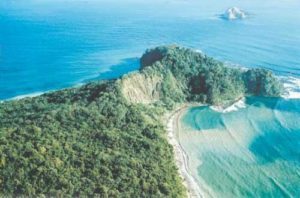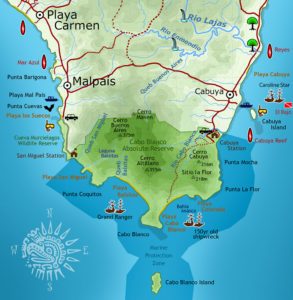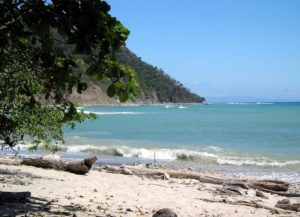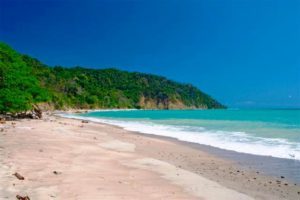
Costa Rica is known worldwide for its stunning natural landscapes and Cabo Blanco Nature Reserve is no exception. This reserve holds a special spot in history as the first national protected park in the country, which paved the way for the entire National Park System we have today.
Located right off the southern-most tip of the Nicoya Peninsula sits the nearly 3,000-acre reserve (comprised of 12 sq km of land and 17 sq km of the surrounding ocean). The area received its name from the Conquistadores meaning “The White Cape”, because of the white earth and cliffs.
Filled with the rich biodiversity this country is known for, Cabo Blanco is an important seabird sanctuary, as well as a great place to observe a variety of mammals and lush plants. These include herons, parrots, ospreys, armadillos, white-tailed deer, anteaters, howler and capuchin monkeys, sloths, porcupines, coatis and felines like ocelots and jaguarundis, or even a pump if you are lucky! At low tide, tidal pools from where you can spot sea urchins and starfish. The bonus is the gorgeous white sandy beach that can be reached by the main SENDERO SUECO (Swedish Trail), which covers 4.2 km and takes four hours to complete.

About a mile offshore (1.6km), there is also Isla Cabo Blanco or what some locals also call Isla Pajaros (Island of Birds), named for the white guano (excrement of seabirds and bats, which is also used as fertilizer)that covers the cliffs. This island is a scientifically significant nesting spot for the protection of brown boobies, which hosts the largest community of these birds in all of Costa Rica. You will also see brown pelicans, frigate birds, laughing gulls, and common terns.
Only 5% of the park is open to visitors, leaving a large 95% of nature untouched where the wildlife can reproduce and live in peace. It withholds the vision of its two intrepid founders: Olof Wessberg (from Sweden) and Karen Mogensen (from Denmark).
In the early 1960s, the couple was living near Montezuma when Olof visited Cabo Blanco to collect seeds for their garden. At that time, only small parts of the primary forest were left, and they became dismayed at the deforestation and clear-cut areas they found. With the aid of foreign conservation organizations, they purchased 1,250 hectares of land and after persistent talks with the Costa Rican government, were awarded the status of an Absolute Nature Reserve in 1963.

Sadly, Olof was murdered on the Osa Peninsula in 1975. The perpetrator cited he was acting on behalf of the residents of Corcovado, who did not want their land to become a national park. Instead, they wanted to clear-cut the forest to plant banana crops and to dig for gold. Despite the tragedy, his wife, Karen continued to fight passionately for conservation and each of them today is recognized by two other nature reserves which bear their name.
And best of all, the Cabo Blanco has shown signs of rehabilitation and growth for the past 50 years. It is a great reminder of how everyday individuals can make a difference in conservation by protecting indigenous species.
Today, Cabo Blanco Nature Reserve is supported by several organizations, including the dedicated rangers and volunteers who work within the park. This past December, the park hosted an educational program in conjunction with local municipalities and schools for the youth (Tambor, Cobano, Pacquera).

As space and resources were limited, the group decided to organize a fun contest, where children would submit their best ideas for environmental conservation. These included projects and videos around innovative waste management, recycling, conservation, and sustainability. The best ideas and projects were awarded a trip to Cabo Blanco, where they participated in activities and educational games focused on environmental issues and conservation.
It is truly a testament to Olof & Karen’s vision that the youth will continue their quest to diligently preserve Costa Rica’s precious landscape for the future.


